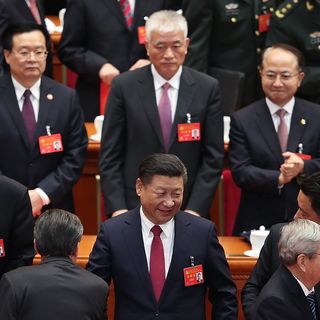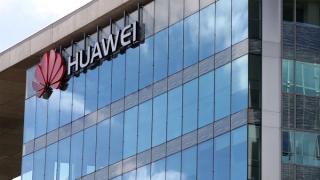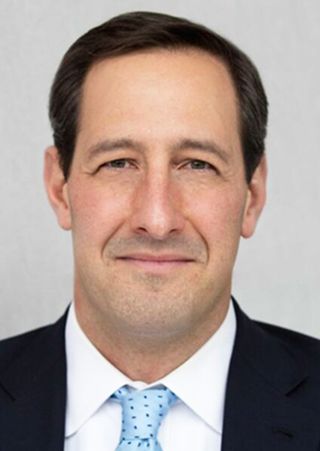The constant eruption of news out of Washington has forced some commentators into the awkward position of arguing that American policy can best be understood by ignoring what the president says, and instead focusing on what the administration does. Whether or not that is true, a similar dynamic is now playing out in the capital of one of America’s closest allies.
On Friday, Malcolm Turnbull was replaced as Prime Minister of Australia by his Treasurer, Scott Morrison, after an extraordinary week of bitter infighting in the centre-right Liberal Party. Amidst the government’s chaos and disunity, the odds have significantly increased that the Opposition Leader Bill Shorten will lead his centre-left Labor Party to victory in an election by May of next year.
The China Challenge

From Washington, last week’s events might just look like another round of blood-sport in a parliament beset by repeated political coups. After all, every Australian prime minister in the last decade has been removed from national leadership midway through their three-year term, by their own party: Julia Gillard knocked off Prime Minister Rudd in 2010, who then reclaimed the leadership in 2013, before losing the general election to conservative Tony Abbott, who governed for only two years before he was challenged and defeated by Malcolm Turnbull in 2015, who last week lost the confidence of his party and was replaced by Scott Morrison.
The recent political chaos, however, masks growing political cohesion on Australia’s China debate across the two major parties. For different reasons and with different political pressures, both the current government (a coalition led by the right-of-centre Liberal Party) and the opposition (Labor) are converging on a similar set of national security decisions, even if the language they use to describe these decisions is vastly different. More importantly, the old contours of Australia’s national security debates are changing.
Knife-fighting Down Under
In Australia’s parliamentary system, the prime minister “serves at the pleasure of the party,” as John Howard famously said. Much like the current and previous speaker of the US House of Representatives — Paul Ryan and John Boehner — as prime minister, Malcolm Turnbull always faced rumblings of discontent from the right of his party. Now, the more right-leaning Morrison is ideologically positioned to unify the party on policy in the lead-up to the next election, but that will not be an easy task.
The foreign policy positions of new Prime Minister Morrison are relatively unknown. He held the Immigration, Social Services and Treasury portfolios in the Abbott and Turnbull governments, and said relatively little about Australia’s foreign and defence policy or regional security publicly, although the treasurer is a member of the National Security Committee of the Cabinet, so Morrison would have had considerable exposure to national security decision-making. Morrison’s most notable actions on international policy have come as treasurer, particularly blocking the sale of Sydney’s “poles and wires” in 2016 to a Chinese state-owned enterprise and a Hong Kong-based investor due to national security concerns. Most recently, in the midst of the leadership drama, Morrison and cabinet colleague Mitch Fifield issued a statement that effectively blocked Huawei from playing a role in Australia’s 5G network: “The Government considers that the involvement of vendors who are likely to be subject to extrajudicial directions from a foreign government that conflict with Australian law, may risk failure by the carrier to adequately protect a 5G network from unauthorised access or interference.”
It is unclear how, exactly, the foreign policy of Morrison’s government will take shape, but those on the right of the party — who ultimately ended Turnbull’s leadership — have championed many positions similar to US Republicans on issues such as immigration and withdrawal from the Paris climate agreement.
It is unclear how, exactly, the foreign policy of Morrison’s government will take shape, but those on the right of the party — who ultimately ended Turnbull’s leadership — have championed many positions similar to US Republicans on issues such as immigration and withdrawal from the Paris climate agreement. That said, Morrison has selected Marise Payne and Christopher Pyne as his foreign and defence ministers. Both are moderates who served as defence minister and defense industry minister, respectively, in the Turnbull government. And, as a relative foreign policy novice who will be squarely focused on uniting the Liberal Party and making it competitive in the months before the next Australian election, Morrison may take a less hands-on approach to foreign policy and regional security than his predecessor.
The change in leadership has occurred at a most interesting moment, as the Australian national security debate is gradually taking on new shapes. The Department of Foreign Affairs and Trade’s Foreign Policy White Paper of 2017 took note of rising regional risks to Australian interests and called for a more active foreign policy. The decision to revamp the Australian Navy and harder language on Chinese activities in the South China Sea were both about responding, albeit gradually, to changes in the region while trying not to upset Beijing too much. Moreover, President Trump’s disruptive style and deep unpopularity in Australia have prompted considerable discussion down under about America’s role in the Indo-Pacific and, critically, the US-Australia alliance.
National security with Australian characteristics
But if things had been moving slowly in the background to reorient Canberra’s focus and priorities, it is Beijing’s influence efforts across Australia and the entire region that have altered the tone and tenure of the Australian national security debate.
For the past two years, Australian politicians, media, universities and the business community have engaged in an increasingly fierce debate about the nature, purpose, and pervasiveness of the Chinese Communist Party’s influence efforts in Australia. While intelligence agencies and political leaders have been aware of Chinese activities for years, public attention is a relatively recent development. Meanwhile, over the past 12 months there have been significant developments affecting the national security debate. A raft of new anti-interference legislation became law in June, with the intent of tightening the rules surrounding political donations, obliging individuals acting as foreign agents to register their activities, and clarifying the legal authorities required to combat foreign interference. Critically, the laws enjoyed bipartisan support from the opposition Labor Party.
In the business community, things have been uneven. Behind the scenes, senior government officials are talking to senior business executives and company boards, briefing them about existing threats, and asking them to confront uncomfortable questions about due diligence and risk assessment. Outside of Canberra, however, significantly louder voices remind Australian commercial interests that China is by far Australia’s largest export market, accounting for roughly one-third of the country’s exports.
Deal-breakers? Regulating foreign direct investment for national security in Australia and the United States

Meanwhile, Chinese activities in the South Pacific and the potential for sweeping changes in Australia’s security environment have caused a sea change in Canberra across the political spectrum. In terms of strategic geography, the Pacific Island nations have long constituted Australia’s backyard — or, in the case of those that sit at Australia’s northern approaches such as Papua New Guinea, the Solomon Islands, and Vanuatu, its front door. Despite China’s increasingly provocative approach in areas such as the South China Sea, the general sentiment among the Australian people seemed to be that China’s actions were concerning, but far away and unlikely to directly affect Australian interests.
Vanuatu may have changed that. Media reports surfaced in early April of discussions between China and Vanuatu about establishing a military base for China’s People’s Liberation Army. As Rory Medcalf, a leading Australian strategic thinker, put it, the establishment of a Chinese military presence in Vanuatu would constitute “a negative turning point in Australian defence policy” that would offer China a foothold to “coerce Australia, outflank the US and its base on US territory at Guam, and collect intelligence in a regional security crisis”. Both the Chinese and the Vanuatu governments denied these allegations, but the reaction in Australia was both swift and bipartisan. Within 24 hours, Prime Minister Turnbull, Foreign Minister Julie Bishop, and Labor’s Shadow Foreign Minister Penny Wong all issued strong statements opposing any such development. Turnbull said "we would view with great concern the establishment of any foreign military bases in those Pacific Island countries," while Wong called it a “potential game changer for the region and for Australia,” which Australia “should regard. . . as a wake-up call. . . in terms of our position in the South Pacific and the leadership role we are expected to play and we need to play in that region”. For Australian policymakers who were concerned, but not overly alarmed about China’s actions in the South China Sea, Vanuatu served as a dramatic realisation of what this would look like closer to home. Recent developments in nearby Tonga and Papua New Guinea have further underscored regional concerns of spreading Chinese political intimidation, debt-trap diplomacy, and military build-ups.
An emerging consensus?
The degree of bipartisanship in Australian foreign policy in the last decade has been noteworthy, remaining broadly consistent when government has changed between the major parties. That pattern looks set to continue should Labor take the reins of government within the next year. Indeed, since Labor was seen to be weak on national security and the US alliance in the 2004 election, which it lost, it has been at pains to “match” the Liberal Party on most if not all major national security decisions — a pattern that has continued with Labor in opposition through the Abbott, Turnbull and now Morrison governments. While bipartisanship has provided consistency, some, such as Andrew Carr from the Australian National University, have argued that it is in fact a weakness, because “a default approach of bipartisanship restricts policy creativity and accountability, reduces public engagement with critical issues” and prevents open debates on “what principles this country stands for, how we will act and what costs we will pay to protect other states and ourselves”. Whereas foreign policy differences receive considerable airtime in congressional and presidential debates, Australia’s state of play on national security is counter-intuitively at odds with the fierce disagreements across most aspects of politics in Canberra.
Over the past several years, both major parties have hardened their positions on China. The Liberal government has increased defence budgets since taking office in 2013, drafted and pushed through sweeping non-interference laws, undertaken a major bureaucratic restructuring, and has acted to curb foreign investment on certain decisions, pressure from Beijing notwithstanding. In his last major foreign policy speech as Prime Minister, and on the eve of the government’s decision on Huawei, Malcolm Turnbull neatly and cheekily quoted Xi Jinping in front of an audience that included the Chinese ambassador and several Chinese diplomats, endorsing “the equality of all countries before international rules”. Turnbull made forthright comments on China at his keynote address at the 2017 Shangri-La dialogue, speaking out against “unilateral actions to seize or create territory or militarise disputed areas” and winning deals “through corruption, interference or coercion”, and warning that “some fear that China will seek to impose a latter day Monroe Doctrine on this hemisphere in order to dominate the region, marginalising the role and contribution of other nations, in particular the United States”. Similarly, then-Foreign Minister Julie Bishop called out China in March 2018 at Kings College London for “ignoring international law and rules for narrow advantage”, and imposing “unfair agreements on less powerful nations”. Last month, the government also found roughly US$100 million to lay an undersea internet cable between the Solomon Islands, Papua New Guinea and Australia amid criticism from China that Australia is trying to contain its influence in the region.
Over the past several years, both major parties have hardened their positions on China.
Although some high-profile former Labor politicians, such as former Prime Minister Paul Keating and former Foreign Minister Bob Carr, have been critical of the Turnbull government’s approach to China and the alliance with America, for the most part the parliamentary Labor Party has not followed suit. Australia’s opposition and likely future government is moving towards a more realistic approach to China, albeit in a slower and less deliberate manner than the Liberal government, as they have not been in power since 2013. What specific policies a Labor-led government might pursue remains an open question as they have so far only been only been outlined or offered in opposition.
Typical of this was a recent speech at the United States Studies Centre on the US alliance and the US role in Australia’s region by Penny Wong, Labor’s foreign affairs spokesperson. Wong was at pains to show Labor’s support for the US-Australia alliance, declaring that “there’s no partisan ownership of the alliance here in Australia”. Wong hails from the left of the Labor Party — historically fertile ground for scepticism regarding treating the alliance as an article of faith in Australian foreign policy — and is no fan of President Trump, but the speech was noteworthy for its emphasis on the “deep values-alignment” between Australia and the United States. Such a phrase might seem commonplace to Americans, but is notable in Australia where politicians are generally far less comfortable talking about values. The speech also called on Australians to recognise that Trump’s anti-democratic inclinations do not represent America’s values, and used values to directly criticise China and therefore elevate the US alliance, by stating “the self-evident point that unlike the US and Australia, China is not a democracy nor does it share our commitment to the rule of law”. Additionally, Labor supported last year’s Foreign Policy White Paper, this year’s anti-interference legislation and is committed to spending 2 per cent of GDP on defense should it win government— low by US standards, but far higher than the 1.59 per cent under Julia Gillard’s Labor government just five years ago.
As a general election looms in the months ahead for Australia, it is unlikely that foreign policy will become a major issue, likely preserving the broad contours of the emerging convergence between the two major parties.
As a general election looms in the months ahead for Australia, it is unlikely that foreign policy will become a major issue, likely preserving the broad contours of the emerging convergence between the two major parties. The government and opposition, and in turn the media, are set to focus on the major domestic policy differences: taxes, energy, health care, and immigration. To the extent that foreign policy will get an airing, it is likely that familiar trend lines of past debates will emerge: The government will cite its national security credentials and tell voters not to trust Labor, which will in turn point to its history of multilateral diplomacy in Australia’s region and suggest it will engage more with states such as Indonesia, Malaysia, and Indonesia.
The two main discussions of foreign policy will center on Chinese influence and the state of the China relationship, particularly given China’s displeasure at several of the Turnbull government’s actions and the gap between the public perception that China is not a threat and the bipartisan worry in Canberra about China’s activities in the region. The two sides will likely criticise each other for Chinese influence in the Western Pacific: The government will argue Labor is weak on national security, while Labor will sharpen its attack on the government’s cuts to the aid budget. However, given that both sides focus on Australia’s budget deficit, and with the election set to be fought on domestic issues, a major new injection of funds for national security seems unlikely.
A wild card here is the question of what impact the new anti-interference laws will have on public debate. With the legislation now on the books, it is likely that a range of public prosecutions are in the hopper. When those prosecutions occur, they could very well shift the public mood — and political temper — quite a bit depending on their timing, the nature of the charges, and how much media attention they end up attracting.
The end of mateship, the beginning of partnership
At least in Australia, one can ignore the chaos and the politicians’ tweets and look at what they’re doing. As if to underscore this point, in the midst of intense political jockeying, parliamentary manoeuvring, press conferences, horse-trading and arm-twisting over whether Prime Minister Turnbull would survive to the end of last week, the government quietly rolled out the announcement of its decision to block Huawei from building Australia’s 5G network. This was a momentous decision that had been building for months and one where politicians of both parties were subject to intense lobbying efforts by both sides of the debate. Domestic and foreign observers — friendly and otherwise — had been focusing on this decision as the yardstick by which to judge Canberra’s willingness to stand firm in the face of Beijing’s (and certain parts of Australia’s business community) displeasure. On any other day than one in which the prime minister might fall, this would have been front-page news. Instead, it was not rolled out at a press conference, but rather issued as part of a perfunctory government statement.
For keen observers looking past Canberra’s latest round of political Game of Thrones, in this at least the lesson was clear: Pay attention to what the government was saying and what it was doing. Those in Washington seeking a more assertive response to Chinese pressure, down under and elsewhere, should take note. Political change in Canberra might bring different figures to center stage. Their language will differ, their tones will diverge, they will have different policy priorities, and they will have to appease different constituencies.
As befits a democratic nation, having emerged from an open, and sometimes bruising political debate about the role of Chinese interference in Australia and across the Indo-Pacific region more broadly, there’s an emerging consensus in Canberra — if not yet across Australia — that Australia’s sovereign interests demand a different set of responses than have guided them to this point. For those reasons, the grammar of the debate will be uneven, even as the logic hardens. There are, of course, any number of factors that could change things. But, given the drift of events, the politics of Australia’s national security policies are converging, however haltingly, under the radar. And, over the horizon, the American-Australian alliance will likely change and grow into an increasingly equal partnership that relies less on nostalgia and bonds of affection (“mateship” as it’s referred to) and more on a willingness to work together not just to admire the problem, but to do something about it by showing policy creativity and initiative, developing greater operational capabilities, undertaking an appropriate division of labour, and committing real resources. In short, shared interests and values in Australia’s region will drive greater focus on combating challenges in the Indo-Pacific.
The Trump administration’s unpredictable approach, coupled with the debate within the United States over whether Washington will prioritise the resources necessary to maintain its long-held role in the region, are all prompting Canberra to think about how to do more both inside and outside of the alliance to boost regional security. Such moves should be encouraged by Washington as amplifications of allied power, even if they arise out of concern about America’s attention and staying power. Unless, of course, Trump’s tweets derail that.







